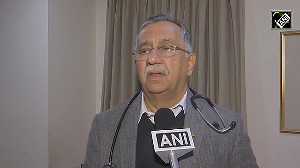The booming ITES-BPO industry, faced with shortage of talent and high attrition, is trying to now attract undergraduates.
Industry managers told reporters in Bangalore on Friday that the trend of hiring skilful and experienced undergraduates (students who don't have a university degree, or those who are studying for a degree, diploma etc) in the last one year had yielded good results.
"We started hiring non-graduates more as an experiment and the team is growing. They are experienced, have skills and perform well," 24/7 customer.com general manager (human resources) G V Giridhar said.
Several firms in Delhi and Mumbai including ICICI Onesource are hiring undergraduates who are paid the same salary as graduates and undergo the same training to serve calls from overseas customers.
The trend may increase as the industry, which employs 170,000 people, would need to ramp up on a massive scale to reach the target of 11 lakh (1.1 million) jobs by 2008 and hiring was likely to move to smaller cities and towns, where firms plan to start their operations.
"We are seeing the trend of firms moving into B class cities like Mysore, Jaipur (where GE has set up its centre) and Indore," ICICI OneSource Ltd vice president (human resources) Aashu Calapa said.
Digital Globalsoft Contact Centre head Prashant Sankaran said his company had formed a task force to identify locations in small cities.
NIIT Ltd senior vice president Suren Singh Rasaily said the industry could be promoted as a 'career' in the customer service industry and make it attractive.
An ITES firm spends an average of Rs 80,000 to recruit and train a person, before he handles the first call of customers.
Rasaily, who is also head of human resources initiative in National Association of Software and Service Companies said a code of ethics for the industry should be brought, wherein poaching by competing firms does not 'harm' the industry.
He said only 50 million English speaking people in India were getting an opportunity to move up and added, "the English language divide was much larger than the digital divide."






 © 2025 Rediff.com -
© 2025 Rediff.com -